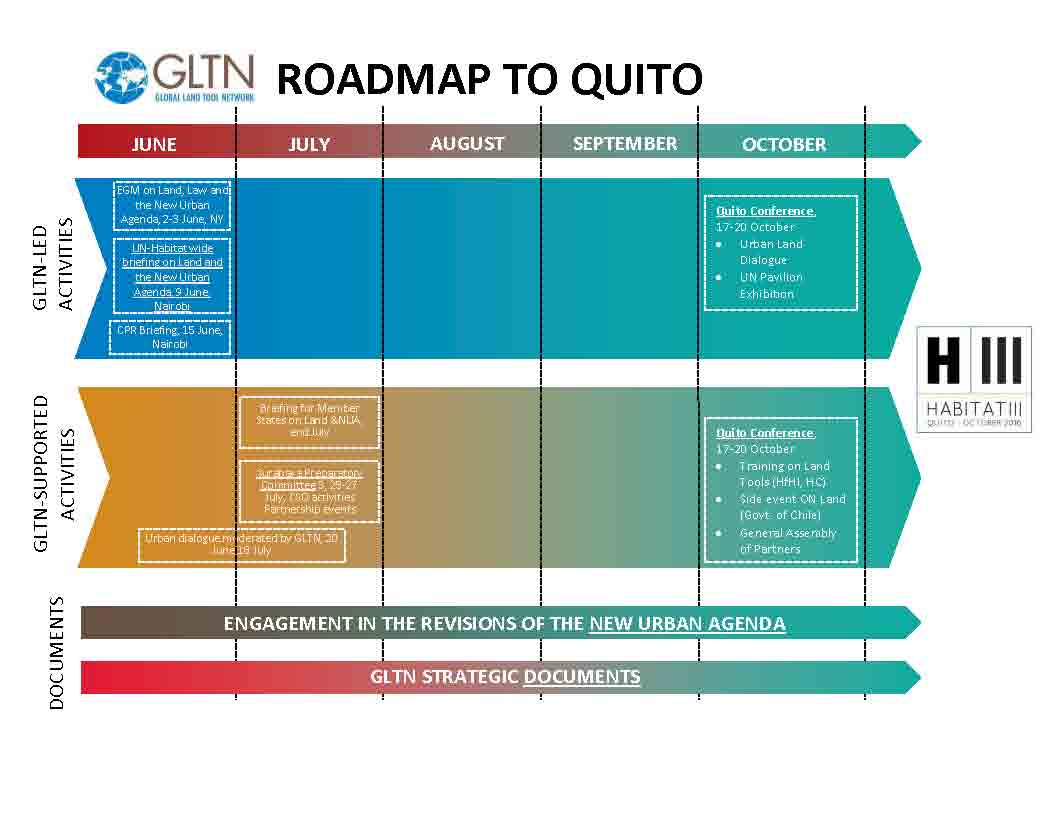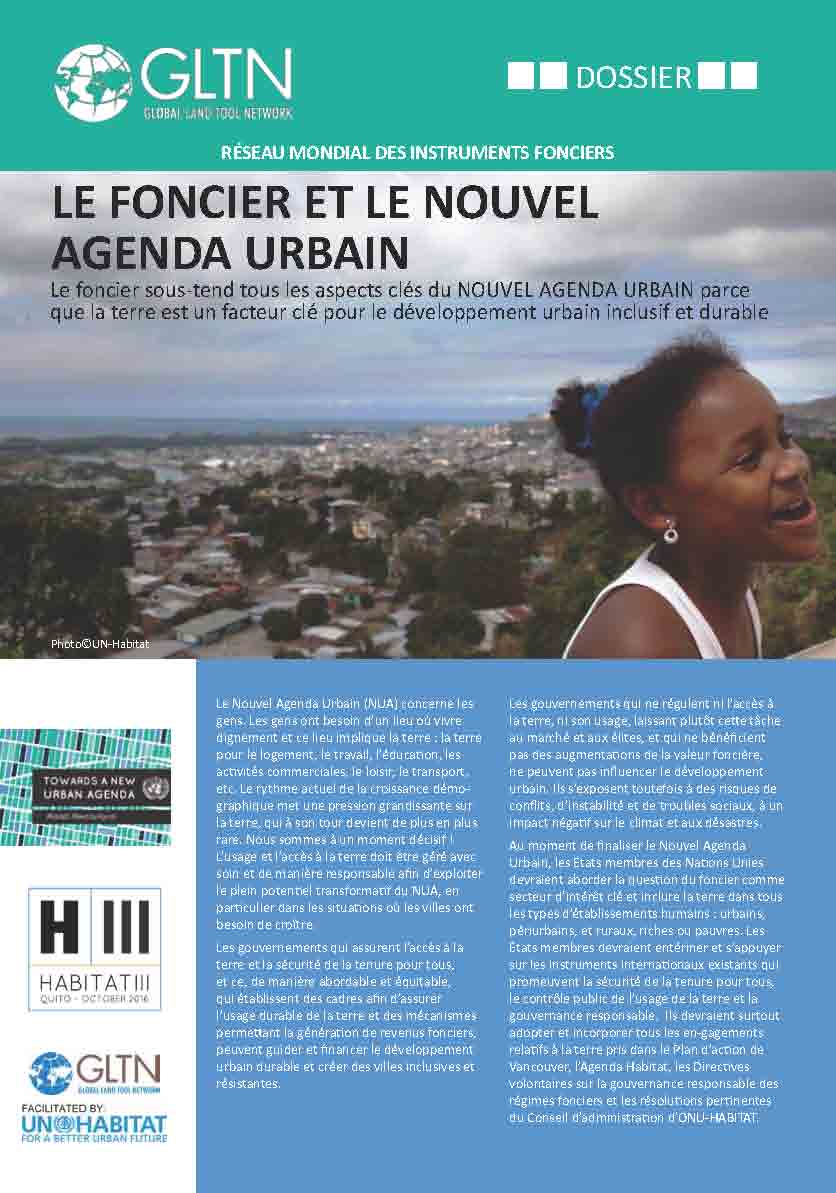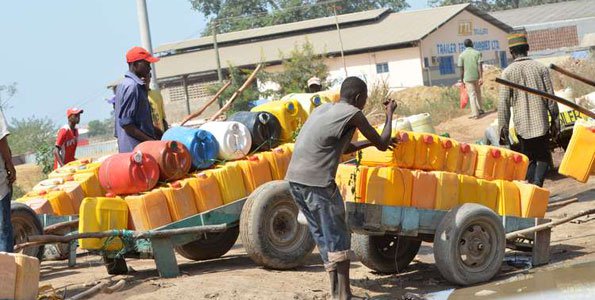THE URBAN BUBBLE PROCESS IN SPAIN: AN INTERPRETATION FROM THE THEORY OF THE CIRCUITS OF CAPITAL
Urbanization in Spain has advanced rapidly in the last twenty years or so. The phenomenon was particularly pronounced in the period spanning 1990-2007, when the construction of housing on a mass scale was a clear indicator of the second circuit of capital accumulation, with space playing a key role through the work of David Harvey. This led to a property bubble – one of the defining features of the economic and financial crisis in Spain between 2008 and 2013.
Le Foncier et le Nouvel Agenda Urbain - Dossier (JUN 2016)
Au moment de finaliser le Nouvel Agenda Urbain, les États membres des Nations Unies devraient aborder la question du foncier comme secteur d’intérêt clé et inclure la terre dans tous les types d’établissements humains : urbains, périurbains, et ruraux, riches ou pauvres.
Jobs in the City
This paper examines the spatial
organization of jobs in Kampala, the capital city of Uganda,
and applies the Lucas and Rossi-Hansberg (2002) model to
explain the observed patterns in terms of the agglomeration
forces and the commuting costs of workers. The paper
suggests that: (i) Economic activities are concentrated in
the downtown -- beyond which employment is spatially
dispersed. (ii) Geographically weighted regressions identify
Migración, fronteras y desplazamientos en la ciudad. Dinámicas de la alteridad urbana en Buenos Aires
A partir del análisis de la experiencia urbana de migrantes bolivianos en la ciudad de Buenos Aires, el artículo problematiza los modos habituales de pensar las relaciones entre territorio, diferencia y desigualdad: el gueto racial y la periferia pobre. En el artículo se resalta la imposibilidad de comprender estos procesos en clave unidimensional, enfatizando la relevancia de las intersecciones de clase, nacionalidad, género y "raza" en la estructuración y uso del espacio urbano.
Basic services remain a challenge in rapidly urbanising Kenya
Kenya’s unprecedented urbanisation rate offers major opportunities, but also puts to the test the new Constitution’s declaration to make access to basic services a basic right for all Kenyans.
What opportunities? Globally, the fastest, most diversifying economic growth and service extensions often occur in urbanising countries.
Good urban infrastructure services — especially transport, water supply and sanitation, electricity and solid waste management — benefit not only cities and towns, but national economies.
Participatory and Community-Driven Development in Urban Areas
This paper aims to contribute to
learning on community engagement and community driven
development (CDD) in urban areas. Specifically, the review
describes the World Bank’s use of participatory and CDD
approaches in urban areas between 2003 and 2013; identifies
the challenges of using participatory and CDD approaches in
the urban context; assesses lessons from the application of
CDD in urban areas through case studies; and makes
Inclusive Cities and Access to Land, Housing, and Services in Developing Countries
Paralleling the increasing disparities
in income and wealth worldwide since the 1980s, cities in
developing countries have witnessed the emergence of a
growing divergence of lifestyles, particularly within the
middle classes, reinforced by the widening gap between the
quality of public and private educational and health care
institutions, spatial segregation, gated communities, and
exclusive semiprivate amenities. This erosion of social
En la periferia de la ciudad y la gobernanza : un estudio de caso sobre la gestión local del agua y saneamiento en el Asentamiento Humano del Cerro Las Ánimas
Lima presenta una inequidad en el acceso a los servicios de agua y saneamiento, por ello la modernización del sector apunta a la universalización del servicio. Esta tesis investiga a partir del enfoque de la ecología política y los sistemas socioecológicos los impactos de la política hídrica urbana en la gestión local del agua en las zonas periurbana de Lima, a través de un estudio de caso sobre el acceso al agua y alcantarillado del Asentamiento Humano del Cerro Las Ánimas, en el distrito de Puente Piedra. La investigación se ampara en los pilares de la investigación cualitativa.
On the Engagement of Excluded Groups in Inclusive Cities
The term “inclusive cities” is
increasingly being used as a “catch-all” phrase to signify
intent but with little precision in its use. In this note we
use “inclusive cities” to mean cities in which we see a
commitment to an inclusive politics with the establishment
of institutionalized interactions between organized groups
of disadvantaged citizens and the state with local
government taking a primary role. They are also cities in
NRC: The Importance of Addressing Housing, Land and Property (HLP)
A new report by the Norwegian Refugee Council (NRC) and the International Federation of Red Cross and Red Crescent Societies (IFRC) outlines eight reasons why it is important to address HLP issues from the outset of a humanitarian response, including:
Saving lives, preventing further displacement and human rights violations
Adapting humanitarian response to complex urban environments
Ensuring equal access to humanitarian assistance
Promoting access to justice in crises contexts and contributing towards durable solutions
A Detailed Anatomy of Factor Misallocation in India
This paper complements the results of
earlier work on factor misallocation. The paper first
expands the methodology and provides two important
decompositions for the main indices. The main result is that
factor and output misallocation across districts is at least
as important as misallocation within districts. Second, the
paper provides an exploration of the service sector that
complements earlier work on manufacturing. The analysis






